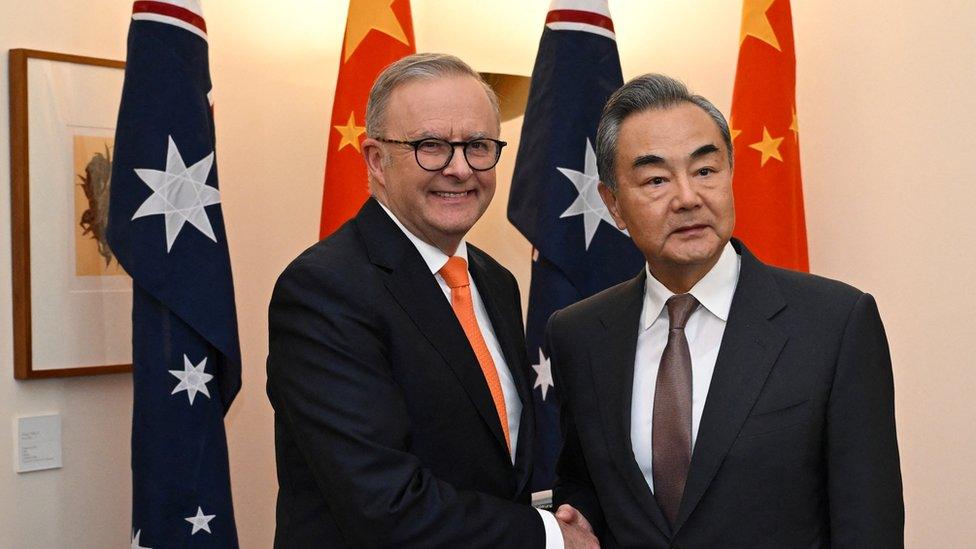China removes tariffs on Australian wine as relations improve
- Published

Australian Prime Minister Anthony Albanese with Chinese Foreign Minister Wang Yi (L) in Canberra last week
China has announced it will remove significant tariffs on Australian wine in another key sign of improving relations between the two countries.
Beijing imposed taxes of more than 200% in 2020 amid a string of economic blows to Australian exports.
That year Beijing targeted Australian coal, barley, timber and lobsters as part of a wider political falling-out.
But China-Australia relations have improved since a new Canberra government was elected in 2022.
Prime Minister Anthony Albanese welcomed the announcement from the Chinese commerce ministry on Thursday, saying his government had also managed to reduce other trade barriers.
Last August, China removed the tariffs it had imposed on Australian barley - another key commodity that had been targeted.
"This outcome affirms the calm and consistent approach taken by the Albanese Labor Government and follows the success of the similar approach taken to remove duties on Australian barley," Prime Minister Albanese said in a statement.
He said his government was still lobbying China on removing remaining tariffs on commodities such as beef and lobster.
China had previously been the most lucrative market for Australian winemakers- accounting for nearly a third of all bottles shipped overseas.
Australian wine representatives said the industry lost A$2.1bn ($1.37bn, £1.08bn) in the year after China was shut off. Despite pivoting to other markets, winemakers struggled to sell the volume of bottles to other countries and have faced a significant glut in recent years.

China's Commerce Ministry on Thursday said it was removing the duties on bottled wine due to "changes in the market situation of the relevant wines in China". The penalty would be removed from Friday.
Beijing had always denied accusations of economic coercion, instead previously justifying its duties on Australian wine as being anti-dumping and anti-subsidy measures.
That had led to Australia filing a complaint with the World Trade Organization against the validity of such penalties. The case was withdrawn last year as the two nations' relations improved, and Canberra confirmed this again on Thursday.
The prospect of the tariff's scrapping had earlier in February been forecast in Australia by government ministers following diplomatic discussions.
And earlier this month, the Chinese commerce ministry published an interim decision indicating the tariffs would most likely be removed.
Last week, China's Foreign Minister Wang Yi also went to Canberra to hold meetings with Australian leaders.
China remains Australia's number one trade partner and export destination for several commodities.
In late 2020, Beijing imposed a series of tariffs and other economic burdens on more than a dozen Australian goods and commodities - citing trade or production issues.
However Canberra saw it as a retaliatory campaign of economic coercion for political steps the Australia government had taken: including being the first Western country to bar Chinese tech firm Huawei from bidding for the country's 5G tender and demanding an inquiry into the origins of Covid-19.
Despite the hits to certain industries- estimated to be worth about A$20bn - the value of the China-Australia trade relationship has remained at a consistent level and trade has increased 12%.
The majority of the value in the A$317bn trading relationship comes from China's reliance on Australian raw materials such as iron ore.